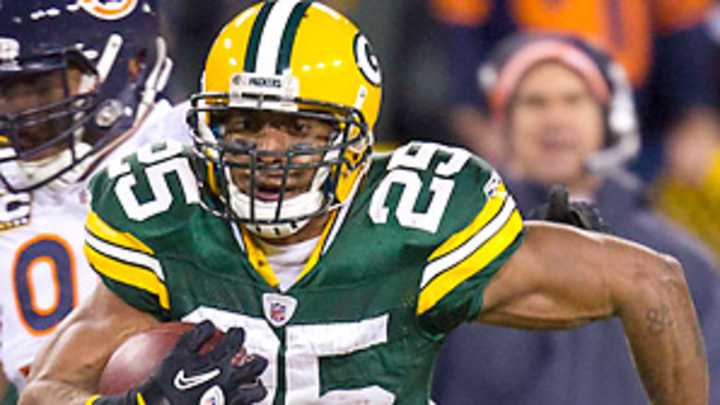Packers face a lot of tough questions this offseason

I sure didn't see that coming. Except for a minor blip in Kansas City a month ago, the Packers were an efficient and precise scoring machine all season. Although their defense certainly could be porous, it made enough plays to win when combined with an offense that scored 35 points per game.
But in the professional sports league where the regular season matters most, it didn't matter here. When many asked about the Packers and a march to a second straight Super Bowl championship, I cautioned that there would be a team peaking at the right time. In other words, the Packers of last year.
It was déjà vu all over again on Sunday. In the 2008 NFC Championship, surely a Giants team coming off two road playoff games -- at Tampa Bay and Dallas -- would wilt in the frigid conditions of Lambeau. Not then, and not now. As to Eli Manning, I am a believer.
Was it the Packers? Was it the Giants? Was it as simple as a team laying an egg at the worst of times? In the end, it doesn't really matter. The long and cold offseason has begun in Green Bay, as in 27 other NFL markets. Much work is ahead, the 15-1 season notwithstanding.
I always hated those days when things came to an end in Green Bay. Players would pack their boxes and trash bags and head out of Lambeau for warmer climes with some asking me "Do you have to stay here?" I would reply that it was my job and, uh, yes, I had to be there.
Looking past the sting of the Giants and ahead to 2012, the Packers' talented scouting staff will uncover gems in the college game as they usually do. The front office will weigh many players under contract, including longtime fixtures such as Chad Clifton and Donald Driver. They will also have to address several free agent issues. There are several, including Pro Bowl center Scott Wells, but here's a look at three difficult ones:
I remember Labor Day 2007 when we acquired Grant from -- you guessed it -- the Giants, who were overloaded at running back with Brandon Jacobs, Ahmad Bradshaw, and Derrick Ward.
Grant -- for the price of a sixth-round pick -- proved a great value with a stellar 2007 season, followed in 2008 with some grumbling about desiring an upgraded contract.
Rather than stonewalling Grant after one good year, the Packers reacted. With the team embroiled in a messy divorce with Brett Favre -- remember him? -- Grant was the beneficiary of fortuitous timing and rewarded with a four-year, $18 million contract. Timing is everything (wonder if Brett received a percentage?).
Grant took a $1 million pay cut this season, reducing his salary from $3.5 million to $2.5 million in exchange for the Packers guaranteeing the lower amount. He is now a free agent with the unfortunate memory of fumbling on his last play.
My sense is the Packers move on from Grant due to (1) a hesitation to commit more guaranteed money to a 29-year old running back, and (2) the presence of younger running backs -- James Starks and Brandon Saine -- with more to come in the offseason.
Finley and his agent are likely negotiating with comparables of the top of the tight end market, a range of about $7 million average per year (APY) with up to $20 million guaranteed.
As for the Packers, I would expect them to be slow-playing this negotiation, perhaps in the $4.5 million APY range with guarantees significantly below those of the top contracts.
With the tight end Tag number reduced to a reasonable $5.5 million, the Packers may look to use the Tag here. Negotiations may continue with Finley through the end of the tagging period -- March 5 -- with the Packers using the leverage of the Tag to try to forge a reasonable deal.
The possible use of the Tag on Matt Flynn is certainly an intriguing theory but an unlikely one.
The quarterback Tag number is projected at $14 million. Applying that number to Flynn transfers enormous leverage to the player. Were I Flynn's agent and were he to receive the Tag, I would have him immediately sign the tender guaranteeing him $14 million -- $6 million more than Aaron Rodgers is scheduled to make. Even if the Tag amount is just a placeholder for a trade and new contract, the leverage swings hard to Flynn for a strong contract either with the Packers or an acquiring team.
Also, as mentioned above, the Packers would like the leverage of a potential Tag -- and reasonable number -- for Finley.
Finally, the NFLPA has expressed that the spirit of the Tag -- if not spelled out in writing -- should be to sign, not trade the player (the Matt Cassel "tag and trade" by the Patriots was differentiated by Tom Brady's rehabilitation from a season-ending injury). Although proof and enforcement may be difficult, the Packers are not a team to test the outer limits of the rules when it comes to the league or union.
The loss of the final game, however unexpected, comes with great finality. The Packers now face a long 2012 offseason ahead, highlighted by these difficult decisions. As always, stay tuned.
Andrew Brandt is an analyst for National Football Post. Follow him on Twitter.
